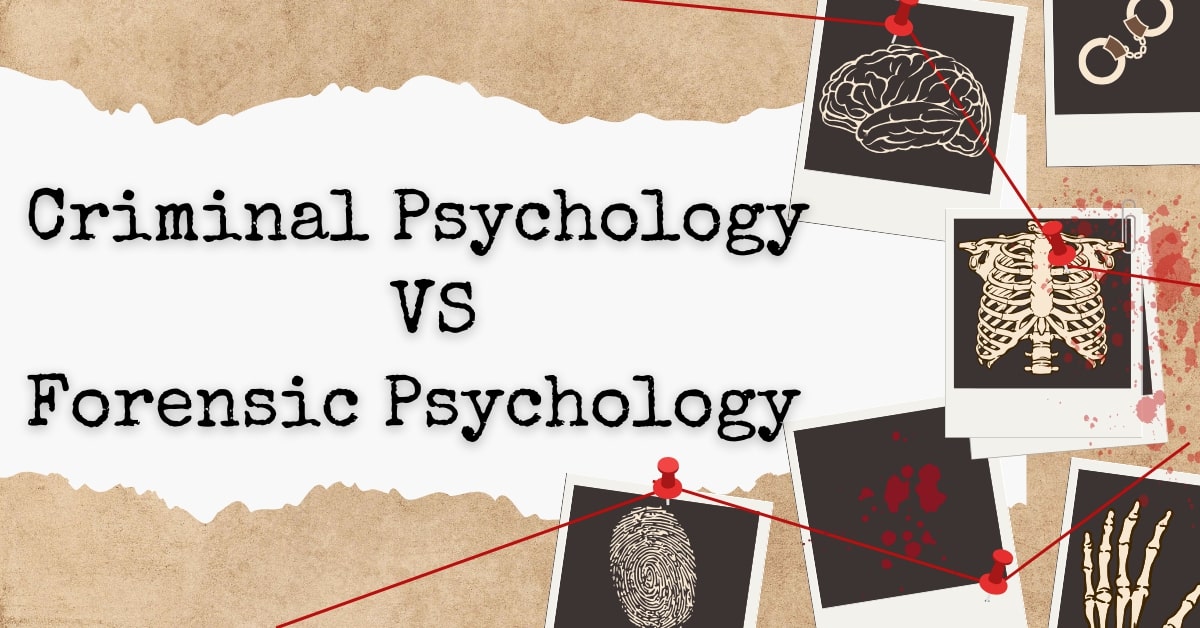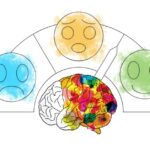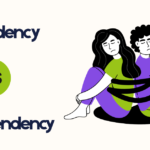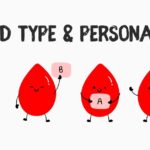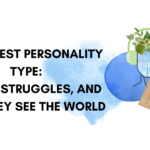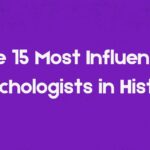Let’s face it crime stories are everywhere. Flip through Netflix, scroll your feed, or even overhear someone at a coffee shop, and chances are, you’ll catch a murder doc, courtroom drama, or some deep-dive into the mind of a killer. It’s gripping. But it’s not just about the shock value. Deep down, a lot of us are asking real questions: What makes someone break the law? What goes on inside their head? And how does the justice system deal with all of it?
That curiosity isn’t staying on screen it’s inspiring people to actually study the psychology behind it all. That’s where two career paths come into play: criminal psychology and forensic psychology.
At first glance, they sound like twins. But once you dig in, you’ll see they’re more like cousins close, but with different roles in the justice world. One focuses on the criminal’s mindset; the other takes a broader look at how human behavior plays out across the legal system.
In this blog, we’re unpacking both what they really mean, how they’re different, and what kind of future they offer if you’re thinking of stepping into this world yourself
Understanding Criminal Psychology
What is criminal psychology, really? In simple terms, it’s the study of people who commit crimes. But it goes a lot deeper than that. Criminal psychologists try to understand the “why” behind criminal behavior. What was going on in someone’s mind when they made that choice? What life experiences shaped them? Was it trauma, mental illness, peer pressure, or something else entirely?
This field is all about recognizing patterns in human behavior, especially the kind that leads to harm. Criminal psychologists don’t just react to crime they try to prevent it. By studying motives and triggers, they help law enforcement figure out how crimes happen, and sometimes, even how to stop them before they do.
Now, if you’ve ever watched a crime show and seen a profiler walk into a crime scene and start describing the suspect’s childhood trauma that’s kind of the idea, but way less dramatic in real life. Profiling is just one part of the job. Criminal psychologists may also give expert opinions incourt, work with police to build cases, or dig through research to find patterns that others might miss.
You’ll find them in police departments, courtrooms, prisons, universities, and even writing crime prevention policies. Some teach. Some consult. Some spend years on research. It’s not a one-size-fits-all path.
Understanding Forensic Psychology
Okay, so forensic psychology, what is it, really?
If criminal psychology is all about getting inside the mind of the person who did something wrong, forensic psychology takes a much wider view. It’s not just about the person who broke the law it’s about everyone affected by the legal system. That includes victims, families, judges, lawyers, social workers, and yes, even the systems themselves.
At its core, forensic psychology is where mental health and law overlap. Forensic psychologists use their knowledge of human behavior to help the justice system make better decisions. Sometimes that means figuring out whether someone is mentally stable enough to stand trial. Other times it’s helping a judge understand what kind of support a trauma survivor might need. It could even be advising a government agency on how to handle youth offenders or how to protect kids in unsafe homes.
The cool (and kind of intense) thing about this field is how varied it is. Some professionals work in prisons, some in hospitals, others in family courts or child welfare offices. One day you might be evaluating a witness; the next, you’re helping write policies that change how victims are treated. You’re part therapist, part detective, part guide to the system.
If you’re the kind of person who cares about fairness, who wants to make sense of people in difficult situations, and who isn’t afraid of big, messy questions, forensic psychology might be your calling.
And if you’re still unsure how it’s different from criminal psychology, don’t worry. That’s exactly what we’re breaking down next.
What really makes criminal and forensic psychology different?
Let’s keep it real, a lot of people mix up criminal psychology and forensic psychology. And it’s not their fault. Shows, podcasts, even articles sometimes throw the terms around like they’re the same thing. But once you start to look closely, the differences are pretty clear, and kind of fascinating.
Criminal vs. Forensic Psychology: Key Differences
| Feature | Criminal Psychology | Forensic Psychology |
| Core Focus | The “Why”: Understanding the criminal’s mind, motives, and behavior patterns. | The “Impact”: Applying psychology to the legal system (victims, courts, juries, law). |
| Primary Goal | To build profiles, identify suspects, and understand why a crime happened. | To assess mental competence, advise judges, and determine how to handle legal outcomes. |
| Who They Study | Mostly offenders and suspects. | Offenders, victims, witnesses, juries, and legal professionals. |
| Common Tasks | Offender profiling, studying crime scene behavior, consulting with police. | Competency evaluations, jury selection consulting, child custody assessments, expert testimony. |
| Workplace | Law enforcement agencies, FBI/profiling units, research centers. | Courts, prisons, law firms, rehabilitation centers, hospitals. |
Criminal psychology is more like zooming in with a microscope. It’s all about the why behind a crime. What made this person act this way? What patterns do they follow? What’s going on in their head? Criminal psychologists spend their time digging into the minds of offenders, building profiles, and helping law enforcement figure people out.
Forensic psychology, though? That’s like pulling out the wide lens. It’s not just about the criminal, it’s about the whole legal system. These folks work with victims, witnesses, families, courts, even government agencies. They help everyone understand how mental health, trauma, and behavior affect justice overall.
If you look at the day-to-day, it’s totally different too. A criminal psychologist might spend their morning studying old crime scene patterns, while a forensic psychologist is in court explaining if someone is mentally fit to stand trial. One is deep in the mind of a suspect. The other might be helping shape legal decisions that affect lives.
Still, there’s overlap. Sometimes they team up. Same case, different angles. One’s asking “Who did this and why?” while the other is thinking, “How do we handle this fairly within the system?”
Two very different paths. Same goal: to make sense of what people do, and help the justice system respond the right way.
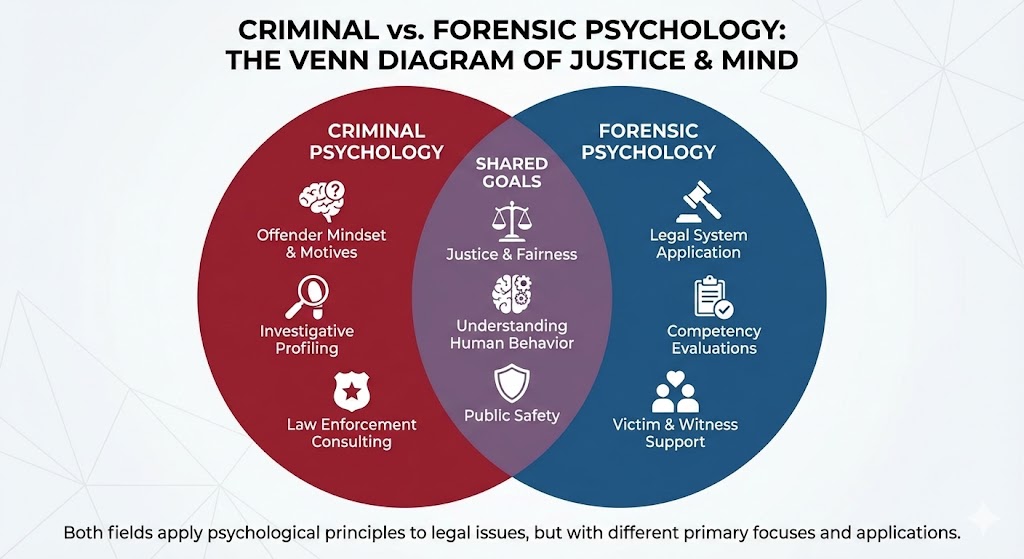
How to Get There: Degrees, Licenses & the Real Story
Let’s talk real. If you’re picturing yourself working in this field, helping catch criminals or showing up in courtrooms as the psychology expert in the room, that’s awesome. But yeah, it does take a fair bit of schooling to get there.
Both careers usually start the same way: a bachelor’s degree in psychology. This is where you build the basics, how the brain works, how people behave, and how to spot the stuff that’s not so normal.
From there, your direction depends on the path you choose. If criminal psychology pulls you in, you’ll want to look into advanced degrees that dive into criminal behavior, abnormal psychology, maybe even criminology. If you’re serious about profiling or teaching, you’ll probably need a PhD or PsyD later on.
Forensic psychology is broader, so your grad school focus might shift toward law, public service, or clinical training. You might learn how to assess someone’s mental state for court, or how to help crime victims heal.
Now, about licensing, this is where it gets a little technical. If you’re planning to do therapy, evaluations, or anything clinical, you’ll need a license. That means completing supervised hours and passing exams. But for more research-based or consulting roles, licensure requirements can vary, and sometimes, you don’t need it at all.
Point is: it’s a journey. But if you’re genuinely curious about people, justice, and what makes the human mind tick, it’s a path totally worth walking.
So… Where Do You See Yourself?
Let’s take a breath for a second. We’ve gone through a lot, criminal minds, courtrooms, job roles, degrees, and now maybe your head’s spinning just a little. That’s okay. You’re not supposed to have it all figured out yet.
Here’s the thing: if you’ve ever caught yourself watching a true crime doc and thinking, “Why would someone do that?”, or if you’ve ever wondered how people are assessed before trial, how justice is actually served, or how trauma affects people long after the crime, then psychology in the legal world might just be your thing.
Now whether that leads you toward criminal psychology, where you dive into the thinking patterns and motivations behind criminal behavior…
Or toward forensic psychology, where you step into the legal system and help it understand the human side of things, it depends on where your curiosity pulls you.
The paths are different, yes. But they also cross. A criminal psychologist might help profile a suspect. A forensic psychologist might evaluate whether that suspect is mentally fit to stand trial. They often work side by side, different roles, same bigger goal: justice, safety, and understanding people better.
Let’s Talk Reality: The Work, The Future, The Payoff
Look, no career is “easy.” And psychology within the justice system? It’s not just what you see in shows, it’s tougher, slower, and often emotional. But it’s also incredibly meaningful.
You could find yourself working in a police department, sitting in on interviews, or quietly doing behavioral research at a university. You might walk through prison gates every day to counsel inmates. Or stand in court as an expert witness, helping a judge understand someone’s mental health. You might work with abused children, domestic violence victims, or people struggling to reintegrate into society.
It’s real work with real people. Not always glamorous, but deeply impactful.
And yes, it takes commitment. Most people begin with a bachelor’s in psychology, then move on to specialized master’s programs. Some even go for a doctorate, depending on their goals. There are also licensing exams in most countries if you want to practice clinically or work with courts. It’s not a race. You build it year by year.
Final Thought: You Don’t Have to Know It All Right Now
If you’re still unsure, don’t stress. Most people don’t wake up one day with their entire career mapped out. You try, you explore, you figure it out.
Start with asking yourself:
- Do I want to understand why people commit crimes?
- Do I want to work within the justice system helping all kinds of people, not just criminals?
- Am I drawn to analysis and research, or do I want more fieldwork and human interaction?
No answer is wrong. And the beautiful part? Both fields let you make a real difference.
So, whether you’re in high school, college, or mid-career and rethinking everything, if you’ve got a mind that questions and a heart that wants to help, then you’re already halfway there.
A passionate psychologist on a mission to make psychology insightful, relatable, and engaging! From mental health to human behavior, I break down complex ideas into thought-provoking reads for curious minds.

